Supernaturalism Theme: An Analysis of Poe's 'The Raven' (Literature)
VerifiedAdded on 2022/09/30
|5
|1186
|445
Essay
AI Summary
This essay provides an in-depth analysis of supernaturalism in Edgar Allan Poe's poem, 'The Raven'. It explores the poem's Gothic characteristics, highlighting the talking raven as the primary manifestation of the supernatural. The essay delves into themes of love, loss, grief, and hallucinations, illustrating how these elements contribute to the overall supernatural atmosphere. The author examines the raven's prophetic role, the thickening air, and the speaker's psychological state to demonstrate how Poe uses supernatural forces to convey the speaker's emotional turmoil and philosophical inquiries. The essay also references the setting, the speaker’s visions, and the use of religious undertones to analyze the poem's broader implications. The references used in the essay support the argument that supernaturalism is a key element in the poem, shaping the narrative and reflecting the speaker's experiences.
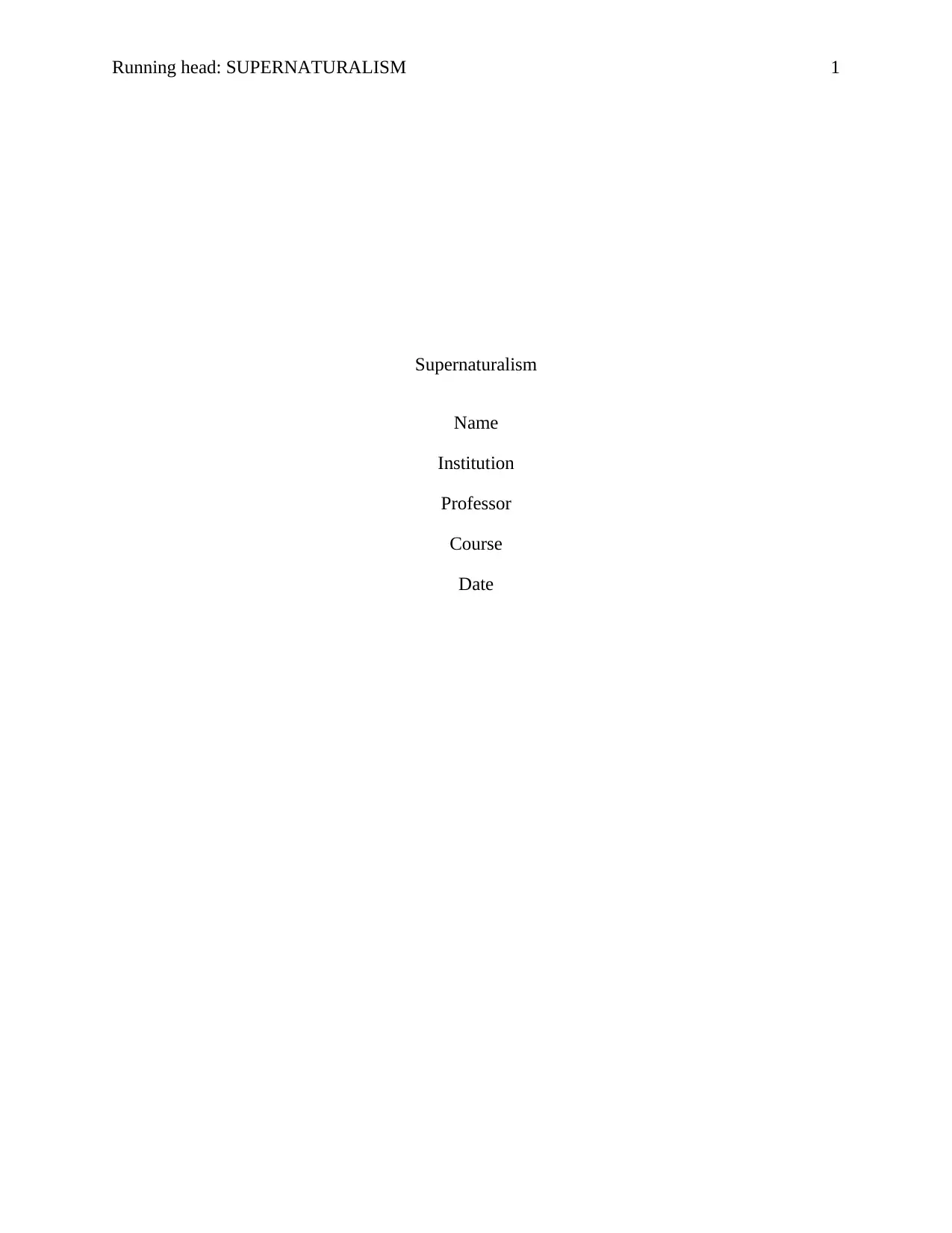
Running head: SUPERNATURALISM 1
Supernaturalism
Name
Institution
Professor
Course
Date
Supernaturalism
Name
Institution
Professor
Course
Date
Paraphrase This Document
Need a fresh take? Get an instant paraphrase of this document with our AI Paraphraser
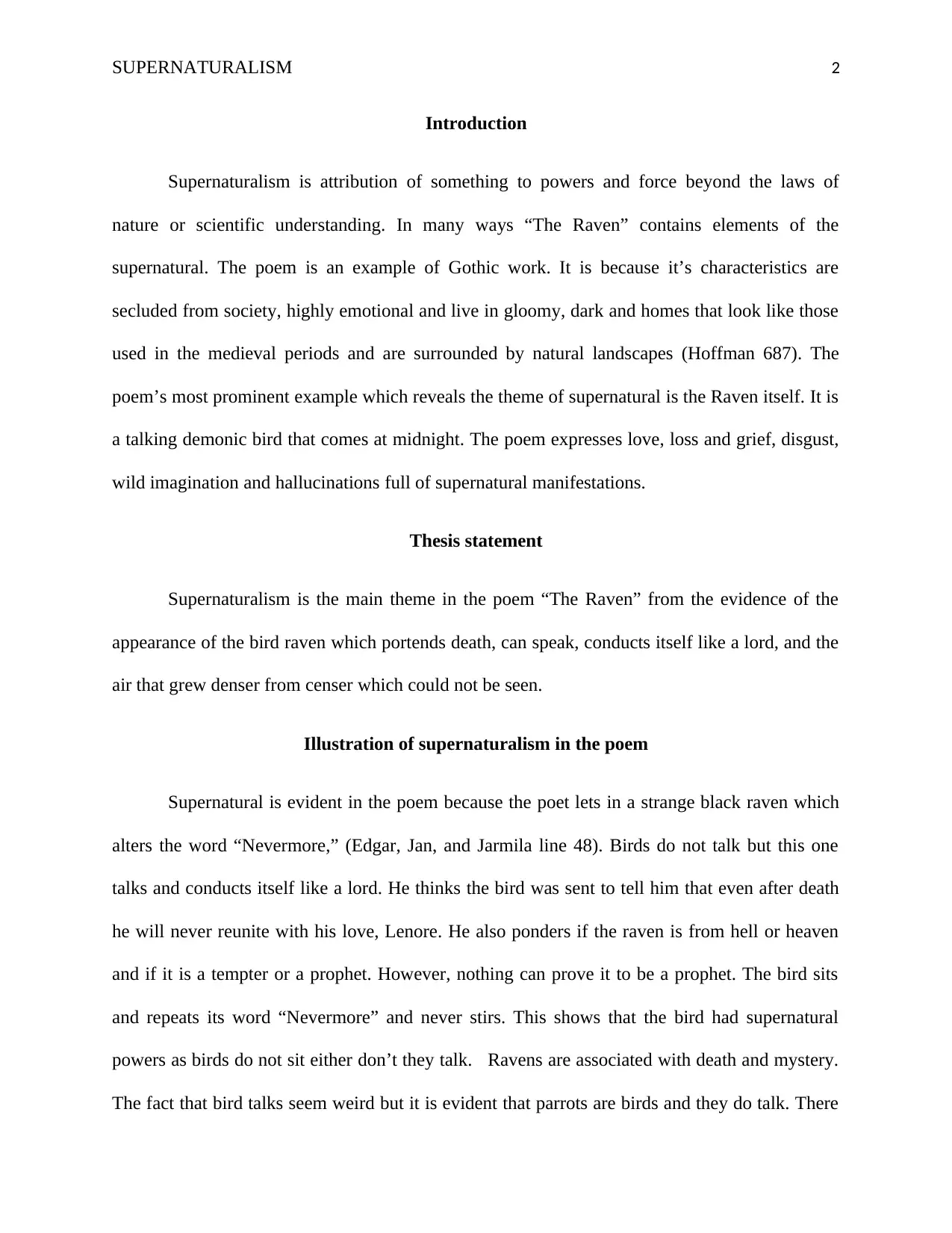
SUPERNATURALISM 2
Introduction
Supernaturalism is attribution of something to powers and force beyond the laws of
nature or scientific understanding. In many ways “The Raven” contains elements of the
supernatural. The poem is an example of Gothic work. It is because it’s characteristics are
secluded from society, highly emotional and live in gloomy, dark and homes that look like those
used in the medieval periods and are surrounded by natural landscapes (Hoffman 687). The
poem’s most prominent example which reveals the theme of supernatural is the Raven itself. It is
a talking demonic bird that comes at midnight. The poem expresses love, loss and grief, disgust,
wild imagination and hallucinations full of supernatural manifestations.
Thesis statement
Supernaturalism is the main theme in the poem “The Raven” from the evidence of the
appearance of the bird raven which portends death, can speak, conducts itself like a lord, and the
air that grew denser from censer which could not be seen.
Illustration of supernaturalism in the poem
Supernatural is evident in the poem because the poet lets in a strange black raven which
alters the word “Nevermore,” (Edgar, Jan, and Jarmila line 48). Birds do not talk but this one
talks and conducts itself like a lord. He thinks the bird was sent to tell him that even after death
he will never reunite with his love, Lenore. He also ponders if the raven is from hell or heaven
and if it is a tempter or a prophet. However, nothing can prove it to be a prophet. The bird sits
and repeats its word “Nevermore” and never stirs. This shows that the bird had supernatural
powers as birds do not sit either don’t they talk. Ravens are associated with death and mystery.
The fact that bird talks seem weird but it is evident that parrots are birds and they do talk. There
Introduction
Supernaturalism is attribution of something to powers and force beyond the laws of
nature or scientific understanding. In many ways “The Raven” contains elements of the
supernatural. The poem is an example of Gothic work. It is because it’s characteristics are
secluded from society, highly emotional and live in gloomy, dark and homes that look like those
used in the medieval periods and are surrounded by natural landscapes (Hoffman 687). The
poem’s most prominent example which reveals the theme of supernatural is the Raven itself. It is
a talking demonic bird that comes at midnight. The poem expresses love, loss and grief, disgust,
wild imagination and hallucinations full of supernatural manifestations.
Thesis statement
Supernaturalism is the main theme in the poem “The Raven” from the evidence of the
appearance of the bird raven which portends death, can speak, conducts itself like a lord, and the
air that grew denser from censer which could not be seen.
Illustration of supernaturalism in the poem
Supernatural is evident in the poem because the poet lets in a strange black raven which
alters the word “Nevermore,” (Edgar, Jan, and Jarmila line 48). Birds do not talk but this one
talks and conducts itself like a lord. He thinks the bird was sent to tell him that even after death
he will never reunite with his love, Lenore. He also ponders if the raven is from hell or heaven
and if it is a tempter or a prophet. However, nothing can prove it to be a prophet. The bird sits
and repeats its word “Nevermore” and never stirs. This shows that the bird had supernatural
powers as birds do not sit either don’t they talk. Ravens are associated with death and mystery.
The fact that bird talks seem weird but it is evident that parrots are birds and they do talk. There
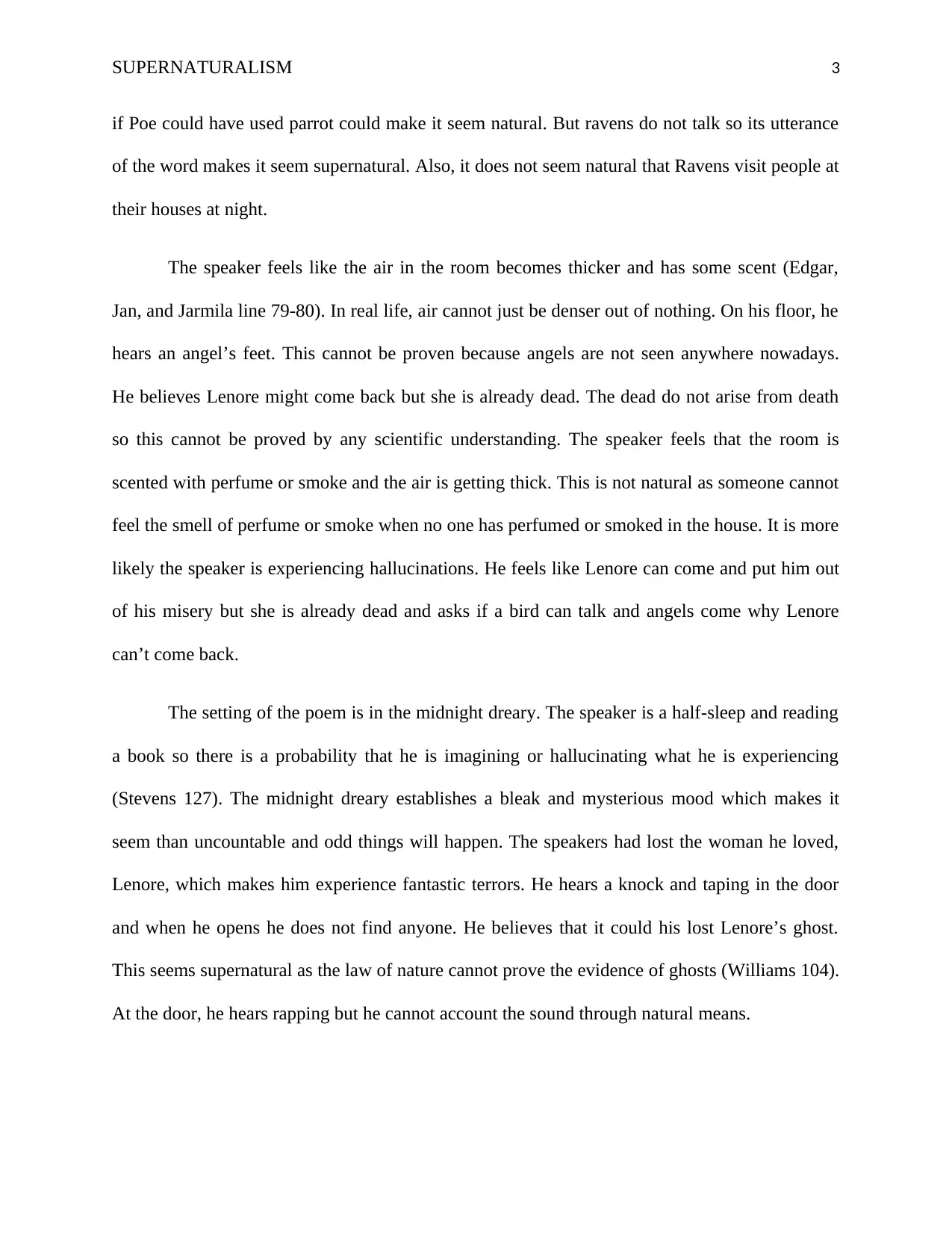
SUPERNATURALISM 3
if Poe could have used parrot could make it seem natural. But ravens do not talk so its utterance
of the word makes it seem supernatural. Also, it does not seem natural that Ravens visit people at
their houses at night.
The speaker feels like the air in the room becomes thicker and has some scent (Edgar,
Jan, and Jarmila line 79-80). In real life, air cannot just be denser out of nothing. On his floor, he
hears an angel’s feet. This cannot be proven because angels are not seen anywhere nowadays.
He believes Lenore might come back but she is already dead. The dead do not arise from death
so this cannot be proved by any scientific understanding. The speaker feels that the room is
scented with perfume or smoke and the air is getting thick. This is not natural as someone cannot
feel the smell of perfume or smoke when no one has perfumed or smoked in the house. It is more
likely the speaker is experiencing hallucinations. He feels like Lenore can come and put him out
of his misery but she is already dead and asks if a bird can talk and angels come why Lenore
can’t come back.
The setting of the poem is in the midnight dreary. The speaker is a half-sleep and reading
a book so there is a probability that he is imagining or hallucinating what he is experiencing
(Stevens 127). The midnight dreary establishes a bleak and mysterious mood which makes it
seem than uncountable and odd things will happen. The speakers had lost the woman he loved,
Lenore, which makes him experience fantastic terrors. He hears a knock and taping in the door
and when he opens he does not find anyone. He believes that it could his lost Lenore’s ghost.
This seems supernatural as the law of nature cannot prove the evidence of ghosts (Williams 104).
At the door, he hears rapping but he cannot account the sound through natural means.
if Poe could have used parrot could make it seem natural. But ravens do not talk so its utterance
of the word makes it seem supernatural. Also, it does not seem natural that Ravens visit people at
their houses at night.
The speaker feels like the air in the room becomes thicker and has some scent (Edgar,
Jan, and Jarmila line 79-80). In real life, air cannot just be denser out of nothing. On his floor, he
hears an angel’s feet. This cannot be proven because angels are not seen anywhere nowadays.
He believes Lenore might come back but she is already dead. The dead do not arise from death
so this cannot be proved by any scientific understanding. The speaker feels that the room is
scented with perfume or smoke and the air is getting thick. This is not natural as someone cannot
feel the smell of perfume or smoke when no one has perfumed or smoked in the house. It is more
likely the speaker is experiencing hallucinations. He feels like Lenore can come and put him out
of his misery but she is already dead and asks if a bird can talk and angels come why Lenore
can’t come back.
The setting of the poem is in the midnight dreary. The speaker is a half-sleep and reading
a book so there is a probability that he is imagining or hallucinating what he is experiencing
(Stevens 127). The midnight dreary establishes a bleak and mysterious mood which makes it
seem than uncountable and odd things will happen. The speakers had lost the woman he loved,
Lenore, which makes him experience fantastic terrors. He hears a knock and taping in the door
and when he opens he does not find anyone. He believes that it could his lost Lenore’s ghost.
This seems supernatural as the law of nature cannot prove the evidence of ghosts (Williams 104).
At the door, he hears rapping but he cannot account the sound through natural means.
⊘ This is a preview!⊘
Do you want full access?
Subscribe today to unlock all pages.

Trusted by 1+ million students worldwide
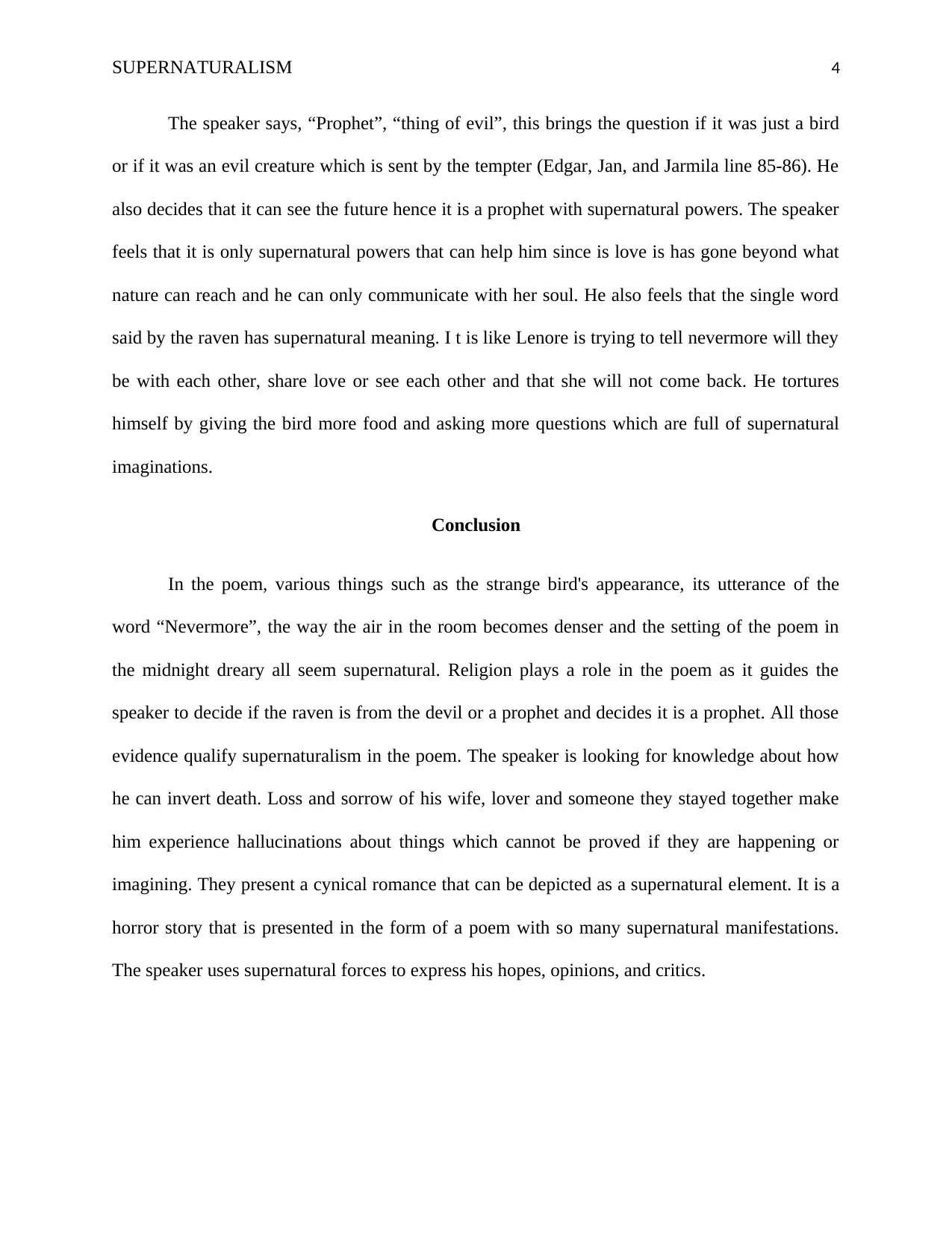
SUPERNATURALISM 4
The speaker says, “Prophet”, “thing of evil”, this brings the question if it was just a bird
or if it was an evil creature which is sent by the tempter (Edgar, Jan, and Jarmila line 85-86). He
also decides that it can see the future hence it is a prophet with supernatural powers. The speaker
feels that it is only supernatural powers that can help him since is love is has gone beyond what
nature can reach and he can only communicate with her soul. He also feels that the single word
said by the raven has supernatural meaning. I t is like Lenore is trying to tell nevermore will they
be with each other, share love or see each other and that she will not come back. He tortures
himself by giving the bird more food and asking more questions which are full of supernatural
imaginations.
Conclusion
In the poem, various things such as the strange bird's appearance, its utterance of the
word “Nevermore”, the way the air in the room becomes denser and the setting of the poem in
the midnight dreary all seem supernatural. Religion plays a role in the poem as it guides the
speaker to decide if the raven is from the devil or a prophet and decides it is a prophet. All those
evidence qualify supernaturalism in the poem. The speaker is looking for knowledge about how
he can invert death. Loss and sorrow of his wife, lover and someone they stayed together make
him experience hallucinations about things which cannot be proved if they are happening or
imagining. They present a cynical romance that can be depicted as a supernatural element. It is a
horror story that is presented in the form of a poem with so many supernatural manifestations.
The speaker uses supernatural forces to express his hopes, opinions, and critics.
The speaker says, “Prophet”, “thing of evil”, this brings the question if it was just a bird
or if it was an evil creature which is sent by the tempter (Edgar, Jan, and Jarmila line 85-86). He
also decides that it can see the future hence it is a prophet with supernatural powers. The speaker
feels that it is only supernatural powers that can help him since is love is has gone beyond what
nature can reach and he can only communicate with her soul. He also feels that the single word
said by the raven has supernatural meaning. I t is like Lenore is trying to tell nevermore will they
be with each other, share love or see each other and that she will not come back. He tortures
himself by giving the bird more food and asking more questions which are full of supernatural
imaginations.
Conclusion
In the poem, various things such as the strange bird's appearance, its utterance of the
word “Nevermore”, the way the air in the room becomes denser and the setting of the poem in
the midnight dreary all seem supernatural. Religion plays a role in the poem as it guides the
speaker to decide if the raven is from the devil or a prophet and decides it is a prophet. All those
evidence qualify supernaturalism in the poem. The speaker is looking for knowledge about how
he can invert death. Loss and sorrow of his wife, lover and someone they stayed together make
him experience hallucinations about things which cannot be proved if they are happening or
imagining. They present a cynical romance that can be depicted as a supernatural element. It is a
horror story that is presented in the form of a poem with so many supernatural manifestations.
The speaker uses supernatural forces to express his hopes, opinions, and critics.
Paraphrase This Document
Need a fresh take? Get an instant paraphrase of this document with our AI Paraphraser
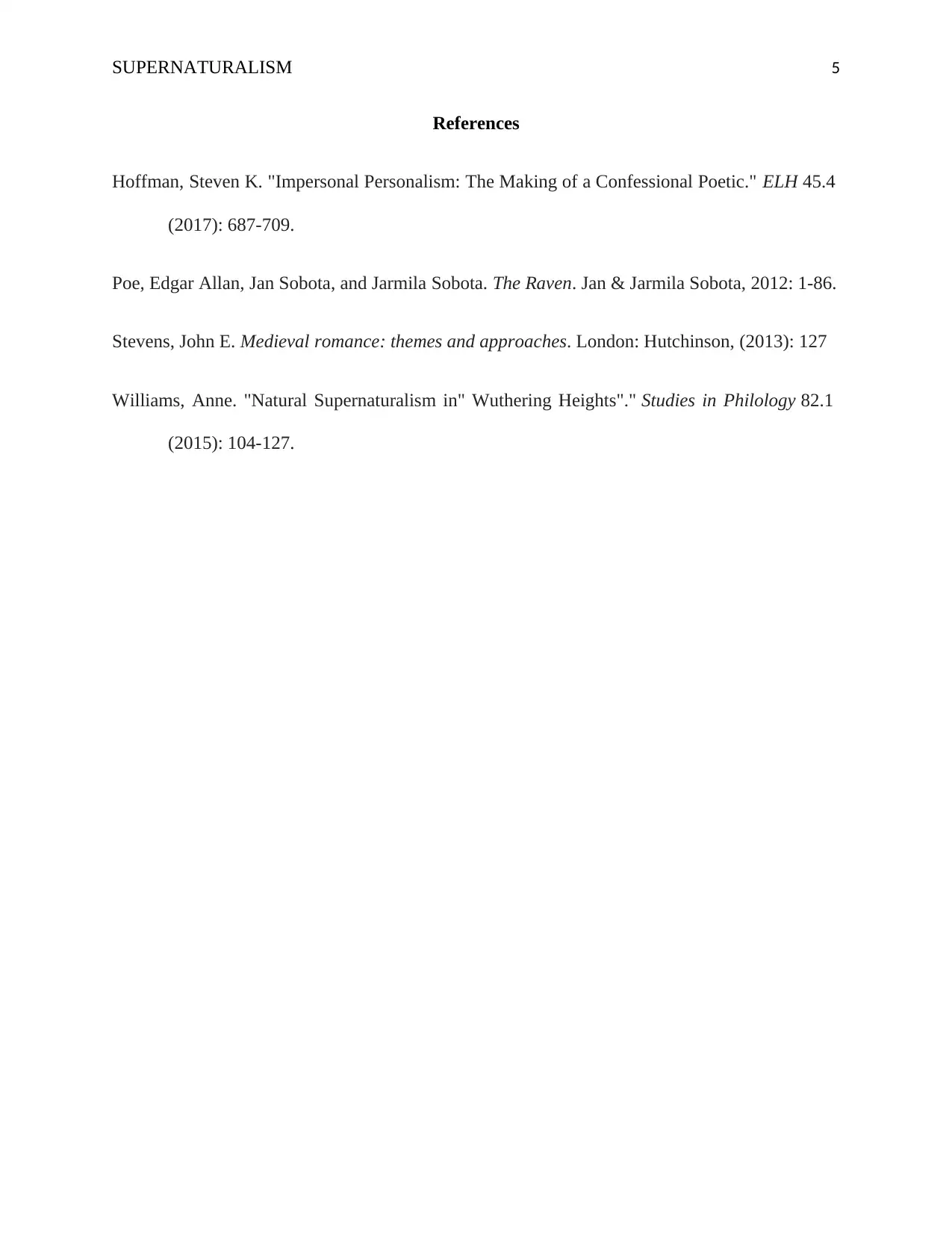
SUPERNATURALISM 5
References
Hoffman, Steven K. "Impersonal Personalism: The Making of a Confessional Poetic." ELH 45.4
(2017): 687-709.
Poe, Edgar Allan, Jan Sobota, and Jarmila Sobota. The Raven. Jan & Jarmila Sobota, 2012: 1-86.
Stevens, John E. Medieval romance: themes and approaches. London: Hutchinson, (2013): 127
Williams, Anne. "Natural Supernaturalism in" Wuthering Heights"." Studies in Philology 82.1
(2015): 104-127.
References
Hoffman, Steven K. "Impersonal Personalism: The Making of a Confessional Poetic." ELH 45.4
(2017): 687-709.
Poe, Edgar Allan, Jan Sobota, and Jarmila Sobota. The Raven. Jan & Jarmila Sobota, 2012: 1-86.
Stevens, John E. Medieval romance: themes and approaches. London: Hutchinson, (2013): 127
Williams, Anne. "Natural Supernaturalism in" Wuthering Heights"." Studies in Philology 82.1
(2015): 104-127.
1 out of 5
Your All-in-One AI-Powered Toolkit for Academic Success.
+13062052269
info@desklib.com
Available 24*7 on WhatsApp / Email
![[object Object]](/_next/static/media/star-bottom.7253800d.svg)
Unlock your academic potential
Copyright © 2020–2026 A2Z Services. All Rights Reserved. Developed and managed by ZUCOL.
